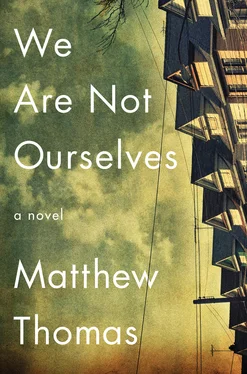These kids didn’t need to know that Connell was pulling good grades. He didn’t want to start out in this town having everyone think he was just a nerd.
“You want another one?” the older guy asked, taking the bottle from Connell’s hands. Connell had drained it into the ground when no one was watching. With Declan looking at him with a slightly buzzed warmth, Connell felt the need to actually drink this one. He took a sip; it tasted bitter.
“You see that girl over there?” Declan was talking louder now. “The blonde? Her name’s Rebecca. She’ll suck your dick. You ever have your dick sucked?”
Connell hadn’t ever even kissed a girl. “Nah,” he said. “Not yet.”
“She’ll fool around with anyone.”
He couldn’t understand why a girl that pretty would fool around with just anyone.
“Did you ever fool around with her?” Connell asked.
Declan’s face spread in a slow smile. “It was great,” he said. “Feels awesome.” He finished off his beer. “Why don’t you go and talk to her?”
Declan pushed him in her direction. She was standing near the older guy who’d given him his first beer, and he chugged the bottle in his hand and went over and asked for another.
“My man,” the guy said approvingly. “Plenty to go around.”
He felt a burp coming up through his chest and let it out as the guy opened his beer for him. Rebecca had a cherubic face and a sweet smile. It was hard to imagine her being easy. Somebody made a joke and she laughed in a giggly way that made a wave of warmth pass over Connell’s body. Declan came over and introduced him to a couple of nearly identically dressed guys, and Connell returned their desultory handshakes. He could feel the alcohol settling in. He felt a strange boldness steal into him.
“Is it always this dead around here?” he asked, and felt Rebecca look interestedly at him.
“Pretty much,” one guy said.
“If I ever brought my boys from the city up here,” he said, “these cops would shit their pants.”
“Hard guy,” one guy said derisively; Connell saw him look at another guy and smirk.
“I used to be in a gang,” Connell said. He saw Declan shake his head. “I wonder what these cops would do if anything real ever happened here.”
The guy made a remark Connell didn’t hear, and the other guys started laughing. He wanted to say something witty, but nothing came to him. Rebecca walked off toward the trees by the river. Declan shifted his body, so he had his back to Connell as he talked to his friends. Connell couldn’t hear them. When the others walked off, Declan stood there with him.
“Please tell me that was ironic,” Declan said. “Please tell me you’re not that corny.”
Connell just drank his beer. When he was done, he went back to the flashlight guy for another.
• • •
People around him began to scatter before he realized what was going on. He was at the outskirts of the group closest to the cop car, and there was time to run and join the pack of kids leaving the park, but for some reason he just stood there. He was drunk, that was certain. He’d never been drunk before. The next thing he knew, an officer was removing the beer from his hand. “That’s evidence now,” the officer said. Another officer told him to stand against the car with his hands behind his back.
He’d played with handcuffs as a kid, but these were more substantial. They dug into his wrist bones. He felt himself being urged down into the car, and he sat back with a wince, the metal digging into his skin. The officers climbed in and they drove off. Through the grating he studied the impressive backs of their heads and felt strangely calm. The revolving lights illuminated the muddy grass outside. He knew he should probably be more upset, but something about this felt inevitable somehow. His parents were going to kill him.
They drove to the station house. One of the officers led him to a little room. “I’ll bring you a glass of water,” he said. “Have a seat.”
Connell sat in the desk chair the officer pointed to, his head pounding. Above him, a framed print depicted a seafaring mission. The officer walked in with a glass, and Connell drained it.
“What I’m interested in hearing is where you got the alcohol. Did you purchase it yourself?”
Connell shook his head.
“I’m going to need verbal responses from you.”
“I don’t know who gave it to me,” he said. “It was an older kid.”
The other officer stood. “This is going to be in the paper, you understand,” he said. “Your school is going to hear about this. Your parents are on their way here.”
“They are?”
“What was the kid’s name?”
“I just moved here, Officer,” he said. “I don’t know anybody’s name.”
“Do you remember anything about him?” the other officer asked.
“He was an older kid. A nice guy. He had on a collared shirt.”
“This kid is wasting our time.”
“You’re going to go to juvenile court,” the first officer said. “We take this kind of thing seriously around here. You should know that right now. This isn’t wherever you came from.”
“Jackson Heights.”
“Wherever the hell.”
• • •
A little while later, his parents arrived. When his mother walked in, she smacked his face. His father looked more concerned than furious.
He was grounded from everything but cross-country practice. At the juvenile court in Eastchester, the DA offered a plea deal: thirty hours of community service. Connell had to stand before the judge. “If I ever see you in my courtroom again,” the judge said, “you’d better have a toothbrush with you.”
On the way out, his mother added her own threat. “If you ever disgrace me like that in this town again,” she said, “don’t come home. And don’t even think of taking another drink until you turn twenty-one. You’re not even close to man enough to handle it.”
“Sorry, Mom.”
“Not even close to man enough,” she said again.
Because Ed’s floor project had taken over most of the kitchen except for a narrow path between the refrigerator, sink, and stove, they ate their meals in the dining room. She was going to have to give up the dining room when Ed turned his attention to the rotted-out floor beneath it, but in the meantime she was determined to enjoy it. She had pinned up a bed sheet to separate it from the living room, which was packed not only with its own furniture but also with the pieces destined for the den and the foyer when Ed was done with the bricks. The dining room was her sanctuary. She had brought it to such a fastidious level of completion that it looked like a little theater in which a nightly drama was staged. The china leaned against the back of the cabinet, the polished candlesticks stood sentinel on the breakfront, the crystals sparkled in the chandelier after a chemical bath, and the white field of the lace tablecloth suggested a pristine altar.
Ed took a seat, rivulets of sweat still running from his head. He dropped his drenched forearms on the table and wiped his brow with the napkin she’d folded neatly.
When the kitchen floor was finished, the new cabinets and countertops could be installed.
“I don’t know why you don’t let me bring a contractor in for the floors,” she said. “We have money for help.”
“I’m doing a fine job,” he said.
“I don’t want to live like this. We didn’t buy this house to live out of boxes. I want a real kitchen.”
They had some money to work with. After they’d paid the depreciation recapture tax (she regretted the low rents she’d charged the Orlandos all those years; the house had hardly generated “income” to speak of) and put 50 percent down on the new house, they’d pulled over forty thousand dollars out of the Jackson Heights house to make improvements with.
Читать дальше
Конец ознакомительного отрывка
Купить книгу












